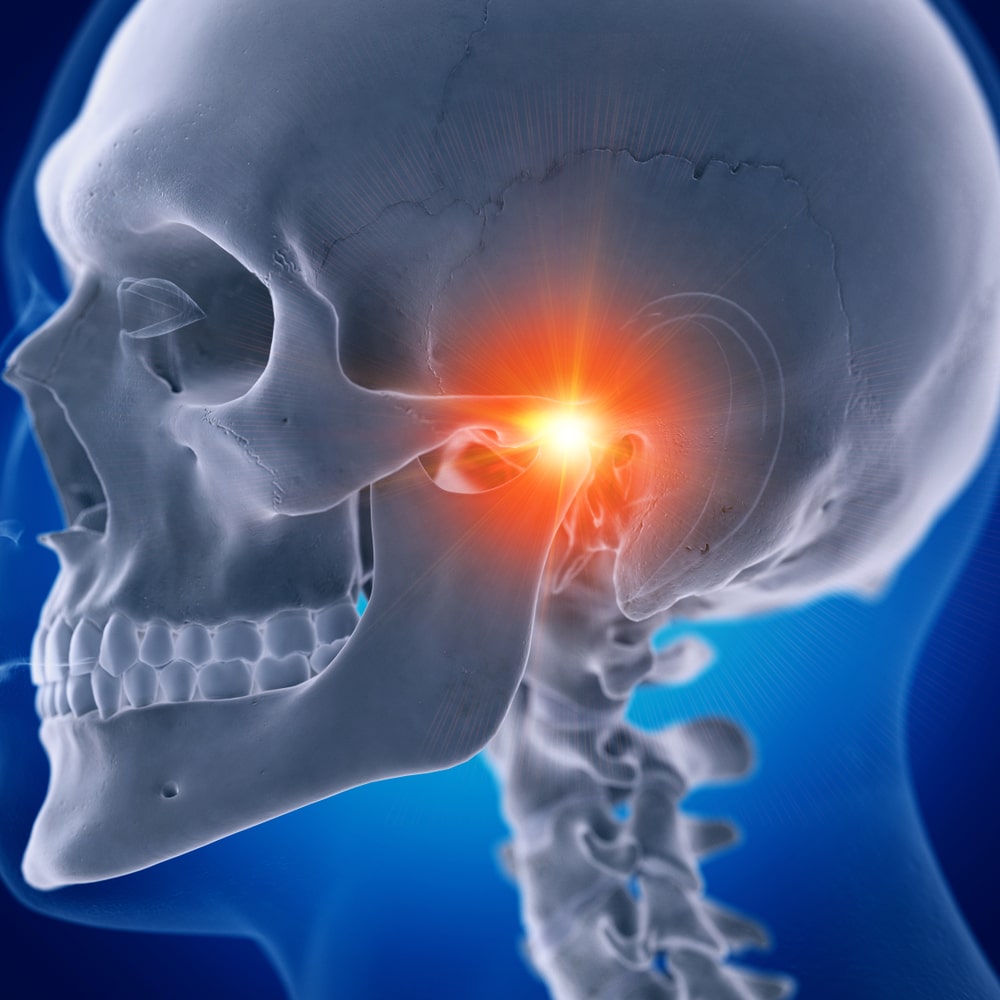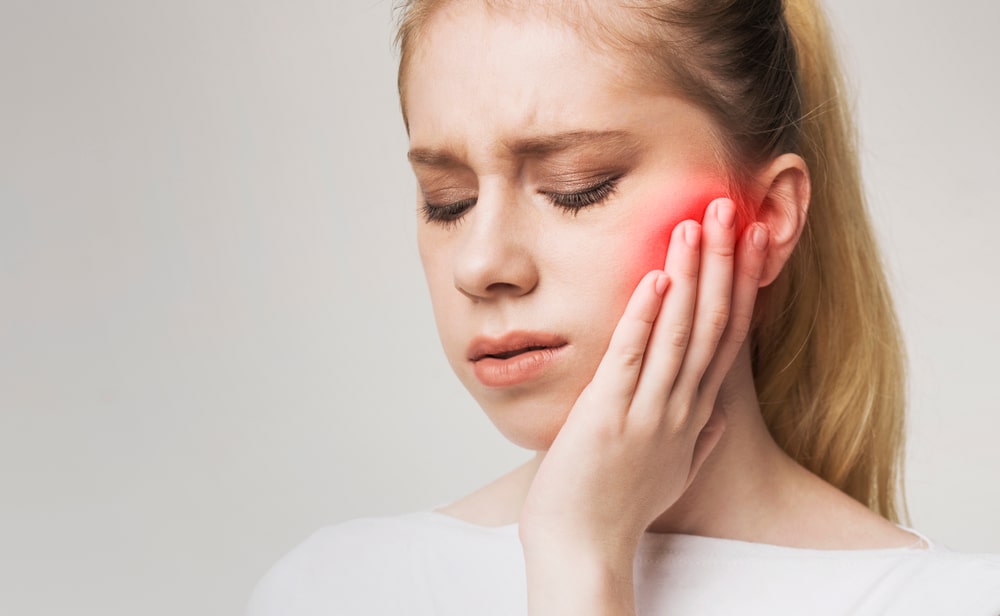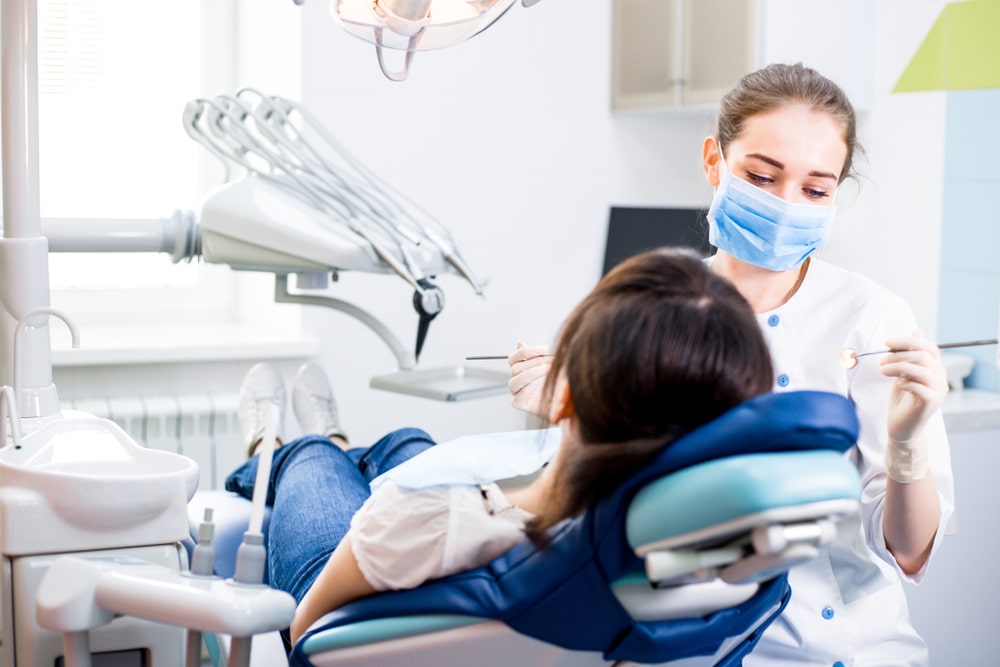TMJ, otherwise known as the temporomandibular joint disorder, affects millions of people across the United States. TMJ causes pain in your jaw joint and the muscles that surround the joint, which controls jaw movement. TMJ can be caused by many genetic and environmental factors, such as teeth grinding, arthritis, jaw injury, etc.
For some, this pain can be easily managed through a few easy at-home remedies; however, for others, TMJ can be detrimental to their way of life, so they seek more serious treatment. Our team has compiled a list of practices you can employ to help achieve TMJ pain relief. If your pain persists, you should reach out to a dentist for further consultation and treatment options.

1. Seek out a treatment plan with Dr. Alex.
In about five appointments, Dr. Alex will consult with you and design a customized treatment plan to treat your TMJ discomfort. As one of the leading dentists in the nation with extensive expertise in treating TMJ disorder, Dr. Alex can offer you long-term TMJ pain relief through a TMJ treatment plan.
2. Ice your jaw
Many people know the benefits of icing your muscles when fatigued or strained, so why not ice your jaw, too? It is important to ice your jaw when feeling fatigued and sore. Icing your jaw for 20 minutes off and on throughout the day can help reduce inflammation and alleviate some of the pain from TMJD.
3. Anti-inflammatory
Over-the-counter, anti-inflammatory drugs can help offer temporary pain relief to those experiencing consistent TMJ pain.
4. Stress reduction and stress management techniques
TMJ is often caused or aggravated by jaw clenching. It is important to be hyper-aware of the daily stressors and activities associated with clenching and grinding and try to reduce these stressful activities as much as possible. Additionally, instilling practices to relax and release the jaw during particularly stressful events can be beneficial to preventing pain.
5. Avoid chewing gum
The motion of chewing gum is not beneficial for those suffering from TMJ. If you are looking for a quick fix for bad breath, we suggest a mint instead!
6. Bite guard or dental splint
A bite guard can be utilized for patients who tend to grind their teeth while sleeping to help prevent clenching and grinding.
7. Physical therapy
For some, exercising the jaw with prescribed movement can help strengthen, prevent and manage pain in the jaw. Nonetheless, it is extremely important to seek out the help of a professional with TMJ experience to help treat the disorders. Googling and practicing exercises found on the internet could actually lead to more pain, resulting in the need for more serious treatment. We’ve included some of the most effective exercises below.
8. Orthotic appliances
Orthotic appliances are designed to place the jaw in the proper neuromuscular position, which are a great semi-permanent solution to relieving and preventing future TMJ pain. Dr. Alex has extensive experience with designing orthotic appliances to treat TMJ and will do a thorough examination and consultation with you to evaluate your jaw and neck muscle activity, the movement of your jaw, and the function of your TMJ joint.
Is Botox the Key to Treating TMJ Disorder?
For cosmetic use, Botox works by temporarily paralyzing the muscles of the treated area and blocking the signal from the nerves to the muscles.
This causes the treated muscles to relax, smoothing and softening the wrinkles. When injected into the temporomandibular joint, or TMJ, Botox relaxes the TMJ and nearby jaw muscles, causing them to weaken and alleviating the hyperactivity of the TMJ muscles that could contribute to the TMJ pain the patient experiences. But while patients of this procedure have found relief with Botox, Dr. Alex cautions that Botox may not be the miracle TMJ treatment it is purported to be.
“The important thing to remember about using Botox for anything is that the results are temporary,” George said. “You may experience great relief following an injection, but if you get too busy to return or simply can’t afford a subsequent treatment, that pain could come right back when the Botox wears off.”
“When you use Botox, you are basically just treating the symptoms by masking the pain,” George said. “When you use orthotics, you are healing the jaw, not simply lessening the pain. You don’t have to keep coming back for more injections or worrying that your TMJ may worsen over time.”
While George is glad options like Botox exist for the treatment of TMJ pain, she believes adjusting the jaw and healing the pain is a better option.
“If you broke your arm, you wouldn’t just want to take painkillers for it for the rest of your life,” she said. “You’d want the bone reset so it would heal and stop hurting on its own. With TMJ pain, it’s no different. I’m glad Botox is helping so many people find temporary relief- but when patients come to my office in chronic pain, they don’t want a quick fix. They want a cure.”
5 helpful exercises for TMJ relief
Here are some of our favorite exercises for TMJ relief.
1. Full goldfish exercise
Goldfish swim with care-free flexibility, and you can also have some of this free feeling in your jaw if you practice this fun-sounding exercise.
- Put your tongue on the roof of your mouth
- Take your index finger and put it on the left TMJ while taking your other index finger and placing it on your chin
- Lightly put some pressure at each point with your chin dropped and your tongue placed on the roof of your mouth
- Repeat this process 6 times a day
2. Open mouth against resistance
In this exercise, you might look a little funny, but it will help relieve some of the pain you feel as a result of TMJ issues.
- Put your thumb beneath your chin
- Lightly push against your chin as you open your mouth
- Hold this position for approximately 3 seconds, then close your mouth slowly
- Do this exercise 10 times
- Wall angle
You may not realize it, but TMJ pain can result in upper back pain. Since the pain in these two areas can be tied together, this particular exercise helps relieve pain in both parts of your body.
- Place the back of your head against a flat wall
- Bend your arms to form a goal post shape, angling them at 90 degrees
- Keeping your arms and shoulders on the wall, move them up and down at a slow pace, also ensuring your jaw is soft and relaxed while the back of your head remains against the wall
- Repeat this exercise for anywhere between 1-3 minutes
4. Up and down stretching
Have you ever taken acting classes? You might have been asked to perform an exercise similar to this one in preparation for a role. This stretching exercise can allow you to experience a bit of TMJ pain relief as well as having something fun and goofy to do.
- Relax your jaw muscles and open your mouth as wide as possible without going past your comfort zone
- Keep your mouth open for a few seconds
- Lightly close your mouth
- Repeat this exercise a few times within a day
5. Breathing
You might think “breathing? But I do this every day?” While this is true, there is a particular way to breathe that can help you relax and might decrease the TMJ pain you feel. Yoga and meditation often use a similar technique of breathing exercises, so why not think about taking these exercises on as well?
- Inhale for approximately 4-5 seconds
- Exhale slowly out your nose
TMJD Treatment from Dr. Alex and the Pittsburgh Dentist Team
If you’re struggling with persistent TMJ pain, relief is possible with the right approach. While at-home remedies can provide temporary comfort, a customized treatment plan with Dr. Alexandra S. George offers a long-term solution for TMJ pain relief. As a leading expert in TMJ treatment, Dr. Alex focuses on healing the root cause rather than just masking the symptoms. Whether through orthotic appliances, bite adjustments, or other proven techniques, our goal is to help you regain comfort and improve your quality of life. Don’t let TMJ pain dictate your daily routine. Contact us today and take the first step toward lasting relief.




